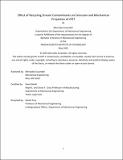| dc.contributor.advisor | Hardt, David | |
| dc.contributor.author | Escandon, Mercedes | |
| dc.date.accessioned | 2025-08-21T17:00:10Z | |
| dc.date.available | 2025-08-21T17:00:10Z | |
| dc.date.issued | 2025-05 | |
| dc.date.submitted | 2025-06-17T16:10:46.960Z | |
| dc.identifier.uri | https://hdl.handle.net/1721.1/162409 | |
| dc.description.abstract | The emerging field of large-scale additive manufacturing has a wide range of applications including the potential to use recycled plastics. A type of 3D printing that can use recycled plastics is Fused Granulate Fabrication, which takes in polymer pellets and melts them down in a screw and barrel before extruding them layer by layer. The process of turning plastic trash into print-ready pellets typically involves sorting, shredding, washing, drying, and re-extruding the material into pellets, each step requiring time, equipment, and energy. To reduce both the cost and carbon footprint of 3D printing with recycled plastic, some of these steps could potentially be eliminated. Washing and drying plastic is a very energy-intensive step that could potentially be skipped or significantly modified. The possibility of using unwashed plastics in 3D printing was explored, focusing on residual beverage contamination.
Controlled amounts of soda were introduced to clean, virgin PET pellets prior to drying. The contamination levels ranged from 0.25% to 3% soda by mass. The plastic was melted and extruded into thin strands using a stationary horizontal extruder and a conveyor belt. The mass flow rate was determined from the mass of strands to quantify the quality of extrusion. No significant effect of contamination level on mass flow rate was measured. The strength of the parts was determined using a tensile test. The Young’s Modulus initially increases with the contamination level, peaking at 1% contamination with a Young’s Modulus of 2.80 GPa, which was 30% higher than the measured value for the clean PET. Above 1% contamination, there was a significant drop off strength. These results demonstrate that there is an acceptable level of beverage contamination when recycling plastic. | |
| dc.publisher | Massachusetts Institute of Technology | |
| dc.rights | In Copyright - Educational Use Permitted | |
| dc.rights | Copyright retained by author(s) | |
| dc.rights.uri | https://rightsstatements.org/page/InC-EDU/1.0/ | |
| dc.title | Effect of Recycling Stream Contaminants on Extrusion and Mechanical Properties of rPET | |
| dc.type | Thesis | |
| dc.description.degree | S.B. | |
| dc.contributor.department | Massachusetts Institute of Technology. Department of Mechanical Engineering | |
| dc.identifier.orcid | 0009-0009-1477-2777 | |
| mit.thesis.degree | Bachelor | |
| thesis.degree.name | Bachelor of Science in Mechanical Engineering | |
